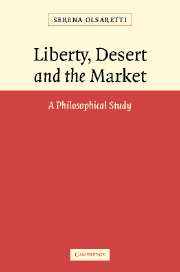Book contents
- Frontmatter
- Contents
- Acknowledgements
- Introduction
- 1 Desert and justifications of the market
- 2 Incentive payments and compensatory desert
- 3 Productive contributions and deserved market rewards
- 4 Liberty and entitlements in the libertarian justification of the free market
- 5 The moralised defence of the free market: a critique
- 6 The free market, force and choice: beyond libertarians and their critics
- Conclusions
- Bibliography
- Index
6 - The free market, force and choice: beyond libertarians and their critics
Published online by Cambridge University Press: 22 September 2009
- Frontmatter
- Contents
- Acknowledgements
- Introduction
- 1 Desert and justifications of the market
- 2 Incentive payments and compensatory desert
- 3 Productive contributions and deserved market rewards
- 4 Liberty and entitlements in the libertarian justification of the free market
- 5 The moralised defence of the free market: a critique
- 6 The free market, force and choice: beyond libertarians and their critics
- Conclusions
- Bibliography
- Index
Summary
FREEDOM AND VOLUNTARINESS: A DISTINCTION
In the last chapter I argued that Nozick's defence of the free market rests on the use of implausible rights-based definitions of freedom and of voluntariness. In this chapter I develop further my critique of the libertarian argument by showing that, quite aside from the problems surrounding its defining of freedom and voluntariness through rights, that defence reflects an unsatisfactory understanding of the central notions it utilises, namely, those of voluntary choice, freedom and coercion. In particular, libertarians have, first, tended to resolve questions of voluntariness by appeal to questions of freedom, thereby ignoring that these two notions are distinct, and that freedom does not suffice for voluntariness. Second, they have singled out coercion as the only illegitimate form of interference, and have failed to appreciate that part of what makes coercion troubling is also found in other types of forcings.
Once these mistakes are revealed, the case for the free market is considerably weakened. Libertarians hold that freedom is sufficient for voluntariness – so that giving people options is enough to ensure that they choose voluntarily – and that the free market, hosting only mutually advantageous exchanges, rather than coercive transactions, is the realm of freedom. But these contentions cannot be defended. A satisfactory account of voluntary choice, I argue, reflects the fact that freedom does not suffice for voluntariness, and that there are non-voluntary choices other than coerced ones that warrant our concern.
- Type
- Chapter
- Information
- Liberty, Desert and the MarketA Philosophical Study, pp. 137 - 161Publisher: Cambridge University PressPrint publication year: 2004



